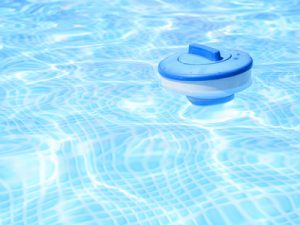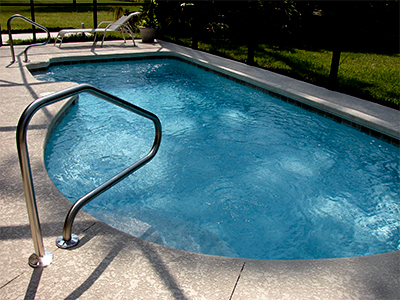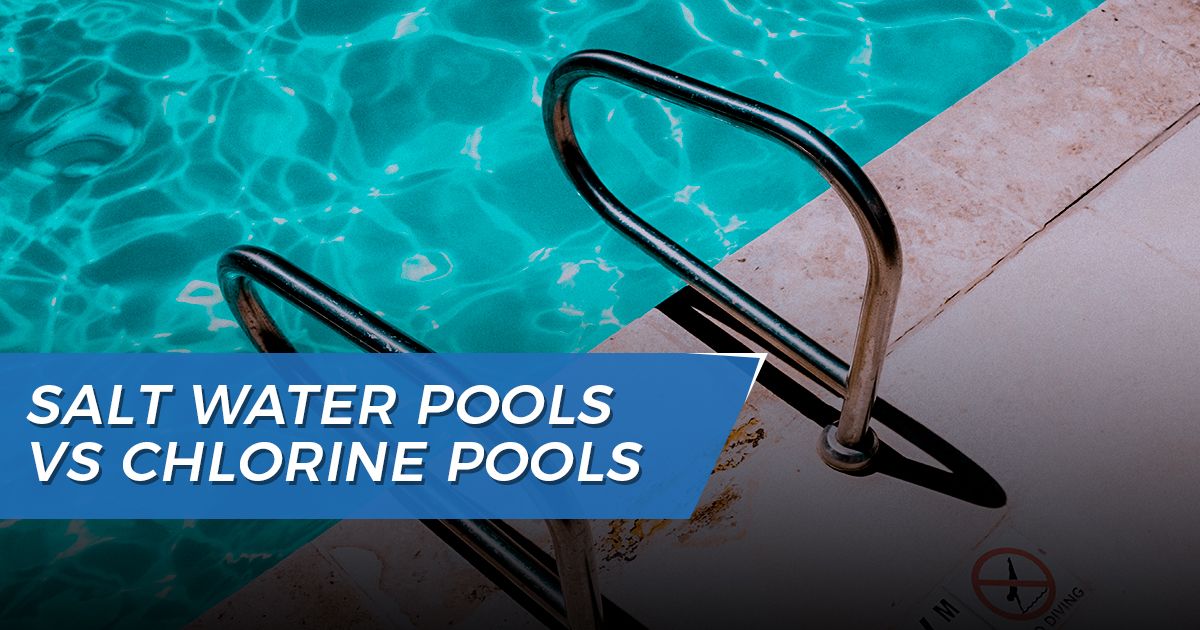Salt Water Pools vs Chlorine Pools: Which is better?
You’ve finally made the decision to put a pool in your backyard and create your own private oasis! It’s a great feeling, but the decisions don’t stop there. You also have to decide what type of budget, shape, size, material, and type of water works best for you. While all of these decisions are major, the choice between salt water pools vs chlorine pools is one of the most important.
In recent years, salt water pools have dramatically grown in popularity and around three-quarters of in-ground pools are salt water. There are a number of benefits when using salt water, which is why many homeowners are choosing to either install them or make the switch. However, salt water pools have a few downfalls that must be considered as well. In the battle of a salt water pool vs chlorine, it’s important to have all of the information.
The Basics of Chlorination
You know that distinct smell we all associate with pools? That’s the smell of chlorine, or hypochlorous acid, and it’s absolutely necessary for the healthy functioning of any pool system. The chlorine works to kill any harmful bacteria in the water and works in conjunction with your filtration system to keep the water clear. The average pool requires between two to four parts per million of chlorine. Without it, pools would look a lot more like cloudy, green ponds than a clean, refreshing oasis. Long story short, we need chlorine, but it’s up to you to decide how you want it to be administered.
Salt water Pools vs Chlorine Pools: The Key Differences

Contrary to popular belief, both salt water and chlorine pools use chlorine to keep the water clean. The main difference lies in how the chlorine is created and added to the pool water.
In your typical chlorine pool, chlorine is manually added to the water in order to create a weak acid called hypochlorous acid. Gradually, the hypochlorous acid breaks down to the point where more chlorine is needed. Salt water pools are a bit different in that they do not require manual chlorination. Instead, a generator uses electricity to separate the water into its core elements of hydrogen and oxygen. The salt then reacts with the hydrogen to create hypochlorous acid. Although the hypochlorous acid eventually breaks down in both types of pools, in salt water pools, the acid naturally breaks down into salt and the process begins again without intervention.
The Pros of Salt water Pools
There are many reasons you might choose to switch from a chlorine to salt water pool. But the next few are the most common.
Salt water Isn’t As Harsh
Not everyone likes the chemical-like smell of chlorine. If you’re one of those people, salt chlorination might be for you. Most of the time, irritation brought on by chlorine is caused by the buildup of chloramines. Fortunately, salt water sanitation prevents this buildup which makes it easier on the nose, eyes, skin, and even swimwear.
Salt water Pools Provide Consistent Chlorination
Many of the most common pool issues, like discoloration or algae growth, are caused by under or over-chlorination. Salt water pools provide a constant level of consistent chlorination, which prevents these issues and ensures the pool water is always safe for you and your family.
Salt water is Less Expensive to Operate
Since salt water pools create their own chlorine from hydrogen and salt, you don’t need to buy the chemicals. Over the lifespan of your pool, this saves you both time and money. No more weekly trips to the pool store!
The Cons of Salt water Pools
Unfortunately, salt water pools also come with a number of downfalls that should not be overlooked.
Salt water Pools Cost More Upfront
Although salt water pools will likely cost you less in the long term, the upfront cost of the salt water chlorination system cannot be ignored. The cost depends on the size of your pool, but the average system can cost anywhere between $1,000-2,500.
Salt water Fixes Aren’t Straightforward
As mentioned before, many of the common issues associated with pools are caused by over or under-chlorination. The perk is that the fix usually involves adding more or less chlorine. On the other hand, salt water issues aren’t quite as straightforward given the complexity of salt water chlorination systems, which means there is a definite learning curve to salt water pool maintenance.
Salt Is Corrosive
Ironically, the same salt water that is gentler on our skin, eyes, clothes, and nose isn’t quite as friendly to its surroundings. Salt water can damage surrounding stonework, pool accessories, and equipment if not properly maintained.
The Investment of a Salt water Pool vs. Chlorine Pool
 There are two aspects to consider when comparing the costs associated with salt water vs chlorine pools; initial investment and maintenance costs. The initial investment for a salt water pool installation is more expensive than a chlorine pool because of the salt water chlorination system. This can add a minimum of $1,000 to the cost of building a pool but can be much higher depending on the size of your pool and type of system you prefer. But, because the salt water chlorination system creates its own chlorine and maintains levels automatically, the operating costs are significantly lower than a chlorine pool. On average, the monthly costs associated with chlorine pools are about two to four times more than a salt water one.
There are two aspects to consider when comparing the costs associated with salt water vs chlorine pools; initial investment and maintenance costs. The initial investment for a salt water pool installation is more expensive than a chlorine pool because of the salt water chlorination system. This can add a minimum of $1,000 to the cost of building a pool but can be much higher depending on the size of your pool and type of system you prefer. But, because the salt water chlorination system creates its own chlorine and maintains levels automatically, the operating costs are significantly lower than a chlorine pool. On average, the monthly costs associated with chlorine pools are about two to four times more than a salt water one.
It’s also important to take into consideration the energy consumption costs associated with each type of pool system. Salt water pools are often associated with higher energy costs as the equipment must run fairly continuously to provide chlorine to the pool. However, this cost can be mitigated by the installation of a variable speed energy-efficient pump, which can actually make your salt water pool more efficient than a chlorine pool.
A Final Point to Consider Between a Salt water Pool & Chlorine Pools
The amount of time and energy you are prepared to spend on your system is also something to consider when choosing between chlorine or salt water pool systems. Chlorine pools need weekly maintenance to manage chlorine, pH, alkalinity, and hardness levels. This requires frequent water tests to ensure the water remains at safe levels. So, if you are the type of person who takes pride in personally taking care of your pool then a chlorine pool is more suited for you. On the other hand, if you prefer to lounge beside or in the pool, rather than maintaining it, then salt water might be best.
Are You Ready to Jump In?
Regardless of whether you’re in the market for a new pool or simply ready to make improvements to an existing one, GPS Pools of Lutz and Land O Lakes can help you make the best decision for you and your family. Give us a call, the sooner you do, the sooner you could be relaxing in your own brand new pool.

